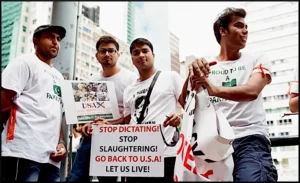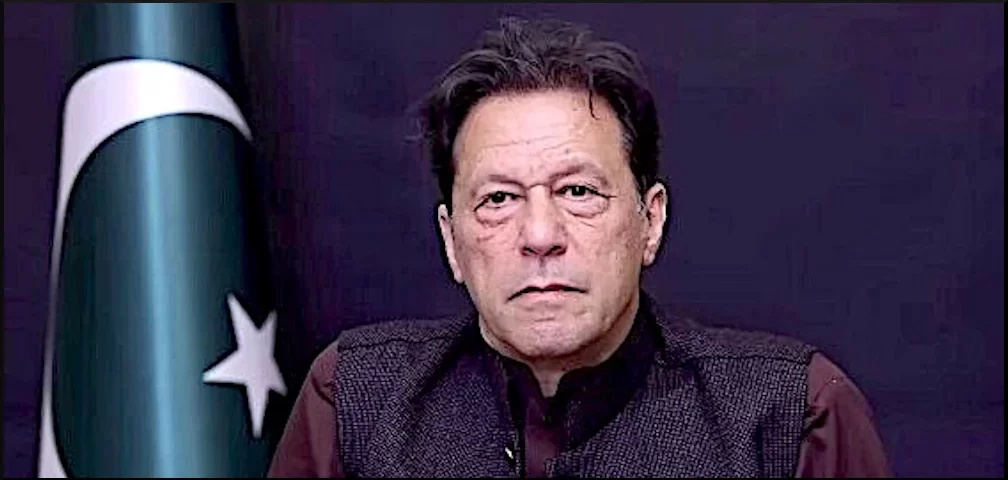by Craig Murray, published on Consortium News, August 9, 2023
Pakistan has imposed a media blackout over the deposed prime minister and thousands of new political prisoners incarcerated in appalling conditions. Condemnation in the U.K. and U.S. has been non-existent.
Given the large population in the U.K. of Pakistani origin, the lack of serious media coverage of the overthrow and incarceration of Imran Khan, and the mass imprisonment of his supporters, is truly extraordinary.
Imran Khan was last week sentenced to three years in prison — and a five-year ban from politics — for alleged embezzlement of official gifts. This follows his removal as prime minister in a C.I.A.-engineered coup, and a vicious campaign of violence and imprisonment against Khan and his supporters.
It is currently illegal in Pakistan to publish or broadcast about Khan or the thousands of new political prisoners incarcerated in appalling conditions. There have been no protests from the U.K. or U.S. governments.
Imran Khan is almost certainly the least corrupt senior politician in Pakistan’s history — I admit that is not a high bar. Pakistan’s politics are — to an extent not sufficiently understood in the West — literally feudal. Two dynasties, the Sharifs and the Bhuttos, have alternated in power, in a sometimes deadly rivalry, punctuated by periods of more open military rule.
There is no genuine ideological or policy gap between the Sharifs and Bhuttos, though the latter have more intellectual pretension. It is purely about control of state resources. The arbiter of power has in reality been the military, not the electorate. They have now put the Sharifs back in power.
Imran Khan’s incredible breakthrough in the 2018 National Assembly elections shattered normal political life in Pakistan. Winning a plurality of the popular vote and the most seats, Khan’s PTI party had risen from under 1 percent of the vote in 2002 to 32 percent in 2018.
The dates are important. It was not Khan’s cricketing heroics which made him politically popular. In 2002, when his cricket genius was much fresher in the mind than it is now, he was viewed as a joke candidate.
In fact, it was Khan’s outspoken opposition to the United States using Pakistan as a base, and particularly his demand to stop the hundreds of dreadful U.S. drone strikes within Pakistan, that caused the surge in his support.
The Pakistani military went along with him. The reason is not hard to find. Given the level of hatred the U.S.A. had engendered through its drone killings, the invasions of Afghanistan and Iraq, and the hideous torture excesses of the “War on terror,” it was temporarily not in the interests of the Pakistan military to foreground their deep relationship with the C.I.A. and U.S. military.
Safety Valve

The Pakistan security service, ISI, had betrayed Osama Bin Laden to the U.S., which hardly improved the popularity of the military and security services. Imran Khan was seen by them as a useful safety valve. It was believed he could channel the insurgent anti-Americanism and Islamic enthusiasm which was sweeping Pakistan, into a government acceptable to the West.
In power, Khan proved much more radical than the C.I.A., the British Tories and the Pakistani military had hoped. The belief that he was only a playboy dilettante at heart was soon shattered. A stream of Khan’s decisions upset the U.S. and threatened the income streams of the corrupt senior military.

Khan did not only talk about stopping the U.S. drone programme, he actually stopped it.
Khan refused offers of large amounts of money, also linked to U.S. support for an IMF loan, for Pakistan to send ground forces to support the Saudi air campaign against Yemen. I was told this by one of Khan’s ministers when I visited in 2019, on condition of a confidentiality which need no longer apply.
Khan openly criticised military corruption and, in the action most guaranteed to precipitate a C.I.A. coup, he supported the developing country movement to move trading away from the petrodollar. He accordingly sought to switch Pakistan’s oil suppliers from the Gulf states to Russia.
Relentless Hit Piece
The Guardian, the chief neo-con mouthpiece in the U.K., on Sunday published an article about Khan so tendentious it took my breath away. How about this for a bit of dishonest reporting:
“… in November a gunman opened fire on his convoy at a rally, injuring his leg in what aides say was an assassination attempt.”
“Aides say”: What is this implying?
Khan had himself shot in the legs as some kind of stunt? It was all a joke? He wasn’t actually shot but fell over and grazed a knee? It is truly disgraceful journalism.
It is hard to know whether the article’s astonishing assertion that Khan’s tenure as prime minister led to an increase in corruption in Pakistan is a deliberate lie or extraordinary ignorance.
I am not sure whether Emma Graham-Harrison, the author of the article, has ever been to Pakistan. I suspect the closest she has been to Pakistan is meeting Jemima Goldsmith at a party.
“Playboy,” “dilettante,” “misogynist” — The Guardian hit piece is relentless. It is an encapsulation of the “liberal” arguments for military intervention in Muslim states, for overthrowing Islamic governments and conquering Islamic countries, in order to install Western norms, in particular the tenets of Western feminism.
I think we have seen how that playbook has ended in Iraq, Libya and Afghanistan, amongst others. The use of the word “claim” to engender distrust of Khan in The Guardian article is studied. He “claimed” that his years living in the U.K. had inspired him to wish to create a welfare state in Pakistan.
Why is that a dubious comment from a man who spent the majority of his personal fortune on setting up and running a free cancer hospital in Pakistan?
Khan’s efforts to remove or sideline the most corrupt generals, and those most openly in the pay of the C.I.A., are described by The Guardian as “he tried to take control of senior military appointments and began railing against the armed forces’ influence in politics.” How entirely unreasonable of him!
Literally thousands of members of Khan’s political party are currently in jail for the crime of having joined a new political party. The condemnation by the Western establishment has been non-existent.
It is difficult to think of a country, besides Pakistan, where thousands of largely middle-class people could suddenly become political prisoners, while drawing almost no condemnation. It is of course because the U.K. supports the coup against Khan.
But I feel confident it also reflects in part the racism and contempt shown by the British political class towards the Pakistani immigrant community, which contrasts starkly with British ministerial enthusiasm for Modi’s India.
We should not forget New Labour have also never been a friend to democracy in Pakistan, and the Blair government was extremely comfortable with Pakistan’s last open military dictatorship under General Pervez Musharraf.
Craig Murray is an author, broadcaster and human rights activist. He was British ambassador to Uzbekistan from August 2002 to October 2004 and rector of the University of Dundee from 2007 to 2010. His coverage is entirely dependent on reader support. Subscriptions to keep this blog going are gratefully received.
This article is from CraigMurray.org.UK.

Thank you for such an enlightening piece. It all sounds like a Chavez story I heard. Anyone opposing the control of the US is in danger.